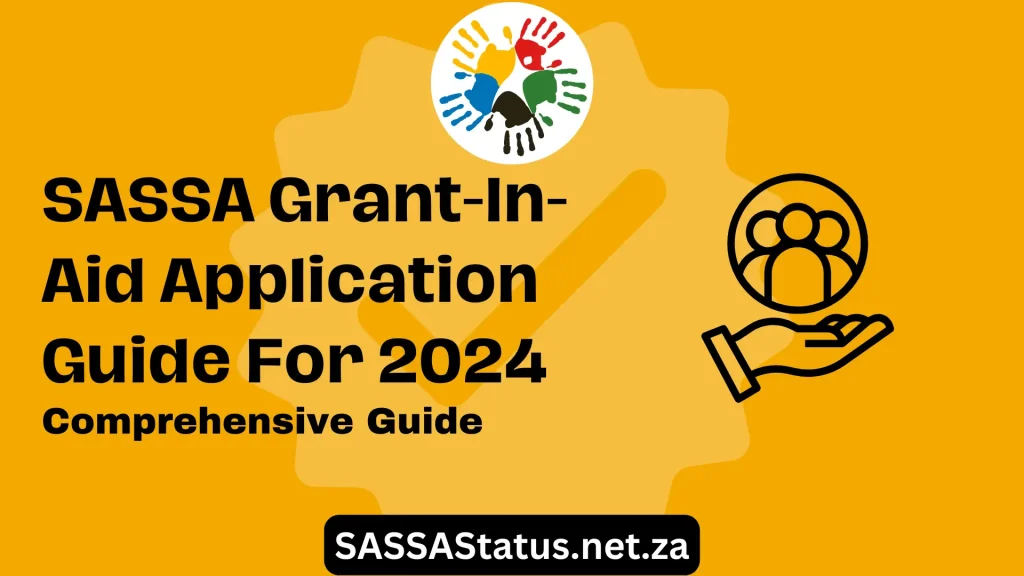SASSA Grant-In-Aid Application Guide For 2024
If you receive a social grant but need help taking care of yourself, you can get extra money to pay someone who always takes care of you. A grant-in-aid is assistance provided in the form of nursing care. This SASSA Grant is an important support system for people who already get disability, old age, or war veteran grants.

It’s for those needing someone to take care of them full-time at home because they can’t manage independently. This guide explains who can apply, how, and what you need to know about the grant.
What Is SASSA Grant-In-Aid?
The SASSA Grant-In-Aid is a program that provides extra money to people who already get social grants but find it hard to handle all their expenses on their own. It’s given to people who are too ill to care for themselves at home. It gives them R510 every month to help them live better.
How Do You Know If You Are Eligible?
To qualify, you must:
What Documents are Required for the Application?
To apply for this, you’ll need the following documents:
How To Apply for a Grant-In-Aid?
Follow these steps to apply.
Step 1: Gather Necessary Documents
Before you begin the application process, ensure you have the following documents ready:
Step 2: Visit Your Nearest SASSA Office
Locate your nearest South African Social Security Agency (SASSA) office. You can find this information on the SASSA website or by inquiring at your local government office.
Step 3: Collect an Application Form
Upon arriving at the SASSA office, request an application form for this program. The office staff will provide you with the necessary paperwork.
Step 4: Complete the Application
Take your time to fill out the application form accurately and completely. Ensure that all the information provided is correct and up-to-date.
Step 5: Attach Required Documents
Attach the documents you gathered in Step 1 to your completed application form. Double-check to ensure that you have included all the necessary paperwork.
Step 6: Submit Your Application
Return the completed application form and the attached documents to the SASSA office staff. They will review your application to ensure it is complete and ready for processing.
Step 7: Wait for Processing
After submitting your application, SASSA will review your documents and assess your eligibility for this program. This process may take some time, so please be patient and await their response.
Step 8: Notification
Once your application has been processed, you will receive a notification from SASSA regarding the status of your application. You will be informed of the next steps if your application is approved.
Step 9: Collect Your Grant
If your application is successful, you will be instructed on how and where to collect your monthly grant of R510. Follow the instructions provided by SASSA to ensure that you receive your grant without any issues.
What is the Doctor’s Assessment Report for this Aid?
The Doctor’s Assessment Report for this grant is an important document. Here’s what it needs to include:
Remember, the report must be recent, within the last 3 months. They won’t accept old reports.
How Much Money will you Get?
Starting October 1, 2023, each eligible person receives R510 monthly through this grant. It is expected to raise R10 per person per month starting April 1, 2024.
How will you Get Paid?
The South African Social Security Agency (SASSA) will give you the money in one of these ways:
If you can’t pick up the money, you can ask someone else to do it at the SASSA office.
When Might they Check your Grant?
Your grant might be reviewed when the authorities assess your other social grants. It usually happens during periodic reviews of your overall eligibility for social assistance. During these reviews, they examine various factors, including changes in your circumstances, to ensure that you still meet the criteria for receiving the grant.
How are Grant-in-Aid Payments Scheduled?
How can you Report Issues Related to the Grant-in-Aid Program?
Quickly telling SASSA about any issues helps them fix things quickly.
What are the Consequences of Committing Fraud Related to this Program?
It’s important to be honest when applying for grants to avoid serious trouble.
What Circumstances lead to the Suspension of a Grant-In-Aid?
Your Aid might stop for these reasons:
What happens if a Grant-In-Aid lapses?
Your grant might stop for these reasons:
What is the Process for Restoring a Grant-In-Aid?
If your grant stopped because of any of those reasons, you can ask to start it again within 90 days of it stopping.
Conclusion
The SASSA Grant-In-Aid serves as a vital resource for individuals requiring full-time care due to disability, old age, or war-related injuries. By providing extra financial assistance, it aims to improve the quality of life for recipients.
Understanding the application process, eligibility criteria, and responsibilities associated with the grant is essential to ensure its effective utilization. If you have any issues, prompt communication with SASSA is crucial for resolution.
Contact SASSA for More Queries
If you’re still confused and have more queries related to your status, then do contact SASSA through verified channels: